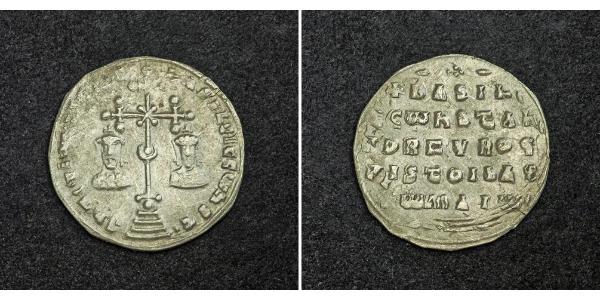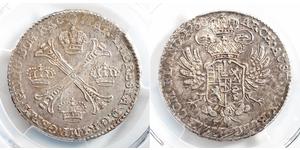(sold for $100.0)
1025, Byzantine Empire, Basil II & Constantine VIII. AR Miliaresion Coin. R!
Mint Period: 989-1025
Reference: Sear 1810. R!
Denomination: AR Miliaresion
Mint Place: Constantinople mint.
Condition: Lightly cleaned, otherwise VF+
Emperor: Basil II Bulgaroktonos & Constantine VIII
Diameter: 23mm
Material: Silver
Weight: 2.5gm
Obverse: Cross crosslet with central X set globe on four steps, between crowned facing busts of Basil and Constantine.
Legend: EN TOVTW NICAT' bASILEI C CWNST'.
Reverse: Legend in 5 lines.
Legend: + bASIL / C CWnSTAn / ΠORFVROS / ΠISTOI bAS / RWmAIW.
em>.
Basil II (Greek: Βασίλειος Β΄, Basileios II; 958 – 15 December 1025) was a Byzantine Emperor from the Macedonian dynasty who reigned from 10 January 976 to 15 December 1025. He was known in his time as Basil the Porphyrogenitus and Basil the Young to distinguish him from his supposed ancestor, Basil I the Macedonian.
The early years of his long reign were dominated by civil war against powerful generals from the Anatolian aristocracy. Following their submission, Basil oversaw the stabilization and expansion of the eastern frontier of the Byzantine Empire, and above all, the final and complete subjugation of Bulgaria, the Empire's foremost European foe, after a prolonged struggle. For this he was nicknamed by later authors as "the Bulgar-slayer" (Greek: Βουλγαροκτόνος, Boulgaroktonos), by which he is popularly known. At his death, the Empire stretched from Southern Italy to the Caucasus and from the Danube to the borders of Palestine, its greatest territorial extent since the Muslim conquests four centuries earlier.
Despite near-constant warfare, Basil also showed himself a capable administrator, reducing the power of the great land-owning families who dominated the Empire's administration and military, while filling the Empire's treasury. Of far-reaching importance was Basil's decision to offer the hand of his sister Anna to Vladimir I of Kiev in exchange for military support, which led to the Christianization of the Kievan Rus' and the incorporation of later successor nations of Kievan Rus' within the Byzantine cultural and religious tradition.

|
Posted by:
anonymous 2014-05-05 |
1/2 Kronenthaler Netherlands Silver
group has 9 coins / 8 prices
⇑























